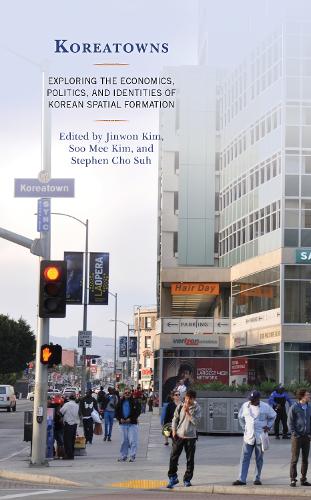
Koreatowns: Exploring the Economics, Politics, and Identities of Korean Spatial Formation
(Paperback)
Available Formats
Publishing Details
Koreatowns: Exploring the Economics, Politics, and Identities of Korean Spatial Formation
By (Author) Jinwon Kim
Edited by Soo Mee Kim
Edited by Stephen Cho Suh
Contributions by Carolyn Areum Choi
Contributions by Yuri W. Doolan
Contributions by Cassandra Gutierrez
Contributions by Jinwon Kim
Contributions by Minjeong Kim
Contributions by Soo Mee Kim
Contributions by Stephen Cho Suh
Bloomsbury Publishing PLC
Lexington Books
21st December 2021
United States
Classifications
Professional and Scholarly
Non Fiction
Ethnic studies / Ethnicity
Social and cultural history
909.04957
Physical Properties
Paperback
218
Width 154mm, Height 219mm, Spine 14mm
354g
Description
This collection defines Koreatowns as spatial configurations that concentrate elements of Korea demographically, economically, politically, and culturally. The contributors provide exploratory accounts and critical evaluations of Koreatowns in different countries throughout the world. Ranging from familiar settings such as Los Angeles and New York City, to more unfamiliar locales such as Singapore, Beijing, Mexico, U.S.-Mexico borderlands, and the American Midwest, this collection not only examines the social characteristics and contours of these spaces, but also the types of discourses and symbols that they exude.
Reviews
Based on a rich compilation of research studies conducted by up-and-coming scholars across the field, Koreatowns offers readers the most up-to-date analyses on the political, economic, and cultural re-formation of contemporary Koreatown communities across the world. Based on new and old Koreatowns from gateway and mid-western U.S. cities to Asia, Mexico, and the U.S.-Mexico borderlands, this collection analyzes how economic restructuring, cultural consumption, globalization, and social inequality have triggered the transnational extension and re-formation of Korean communities in ways that both connect as well as stratify. Readers can learn about emerging phenomenon, such as K-wave cultural communities, post-riot political and cultural formations, trans-border U.S.-Mexico Korean enclaves, Korean military bride camptowns, and stratified international student pathways. This book is a must-read for anyone looking for a fresh perspective on Koreatown and the Korean diaspora and is sure to generate new ideas and discussions on global ethnic enclaves today. -- Angie Y. Chung, University at Albany, SUNY
Covering a wide and varied range of Korean diasporic neighborhoods such as metropolitan areas to border towns, this book examines Koreatowns through economics, politics, and culture, while exploring how Korean descendants came to be emplaced throughout the world, especially North America and Asia. It succeeds in advancing literature on immigrant communities, which had focused on spatial concentrations of immigrant enterprises. It also updates Korean socio-spatial formation in the contemporary transnational and global context. It is refreshing to read a sociological work that grounds itself in physical space before engaging topics such as online community and pop culture. -- Kyeyoung Park, UCLA
Author Bio
Jinwon Kim is assistant professor in the Department of Social Science at New York City College of Technology.
Soo Mee Kim is lecturer in sociology at California State University, Los Angeles.
Stephen Cho Suh is assistant professor of sociology and womens and ethnic studies at the University of Colorado, Colorado Springs.
